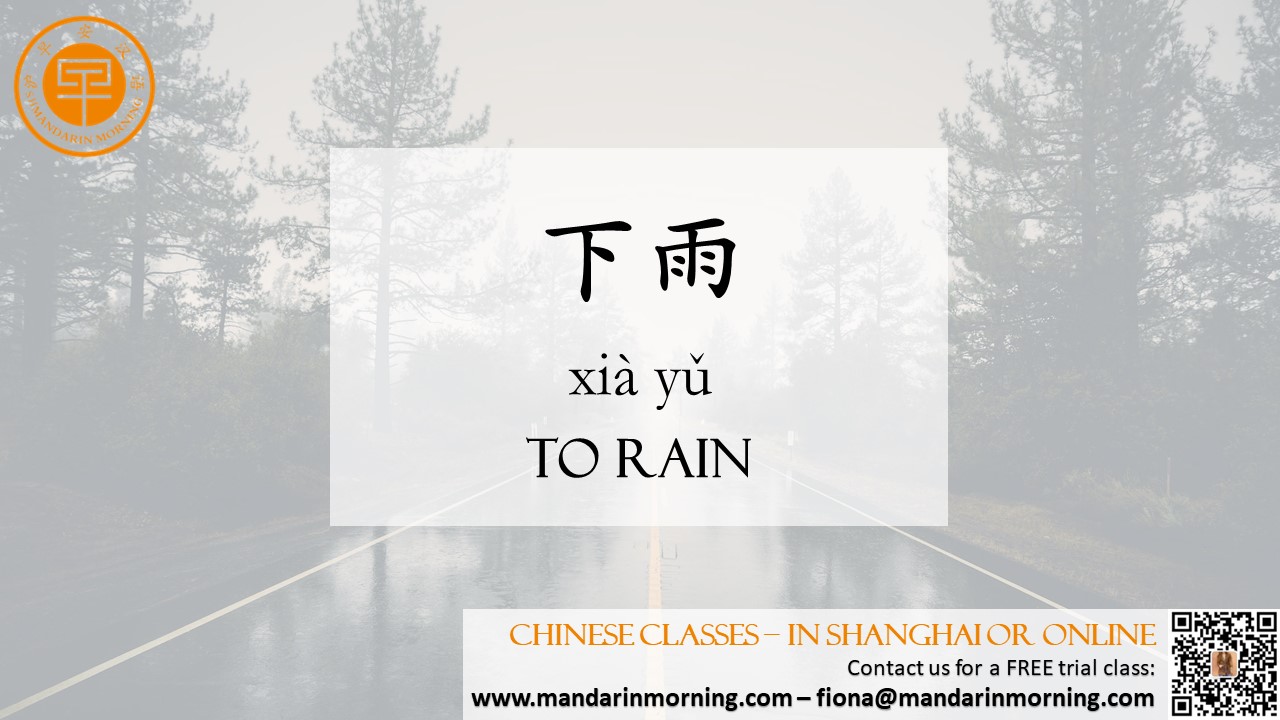When talking about the weather in Chinese, it’s generally enough to simply apply the Chinese grammar rules that you already know. One thing that’s important to keep in mind, however, is that many words for weather events in Chinese can act as different parts of speech depending on context. Let’s examine the use of the common Chinese words 雨 (yǔ; rain) and 雪 (xuě; snow) to get an idea of how this works. In English, the words “rain” and “snow” can be used as either nouns or verbs. If we say, “The rain is falling,” we are using “rain” as a noun, whereas if we say, “It’s raining,” we are using “rain” as a verb. When we want to use these words as verbs in English, we need to conjugate them. Since verbs cannot be conjugated in Chinese, however, we need to use a different strategy. The noun form of the word “rain” in Chinese is 雨 (yǔ). If we want to use this word as a verb, we need to place the verb 下 (xià) in front of 雨 (yǔ) to show that the rain is falling. This produces the verb 下雨 (xiàyǔ), which means “to rain.” Likewise, the noun form of snow in Chinese is 雪 (xuě), and adding 下 (xià) to this character will also produce the verb form, namely 下雪 (xiàxuě; to snow). Here are some examples of how to use these words in a sentence: 今天会下雨。(Jīntiān huì xià yǔ) - It’s going to rain today. 昨天下雪了。(Zuótiān xià xuě le) - It snowed yesterday. If, on the other hand, we want to use these words as nouns in a sentence, it isn’t enough to simply use them by themselves. This is because in general, nouns in Chinese must be paired with measure words. The most common Chinese measure word that’s used to refer to rain or snow is 场 (chǎng; period of time, spell). Let’s look at how to use this measure word in practice: 这是今年的第一场雪。(Zhè shì jīnnián de dì yī chǎng xuě) - This is the first snowfall of the year. One interesting and slightly confusing aspect of this measure word is that it can also be used in sentences that contain the verb 下 (xià). For example: 昨天下了一场雨。(Zuótiān xiàle yī chǎng yǔ) - It rained for a while yesterday. This sentence communicates the fact that it rained yesterday, so you may wonder why you couldn’t just say 昨天下雨了 (Zuótiān xià yǔ le; It rained yesterday). The difference lies in the fact that 一场 (yī chǎng) refers to a set period of time, so the sentence 昨天下了一场雨 (Zuótiān xiàle yī chǎng yǔ) specifies that it rained for a duration time, not all day. This use of the measure word 场 (chǎng) communicates the fact that the rain both stopped and started yesterday. By contrast, if you simply said 昨天下雨了 (Zuótiān xià yǔ le; It rained yesterday), the meaning wouldn’t be as clear. According to this sentence, it could have rained for a period of time yesterday, but it also could have rained nonstop throughout the entire day. |